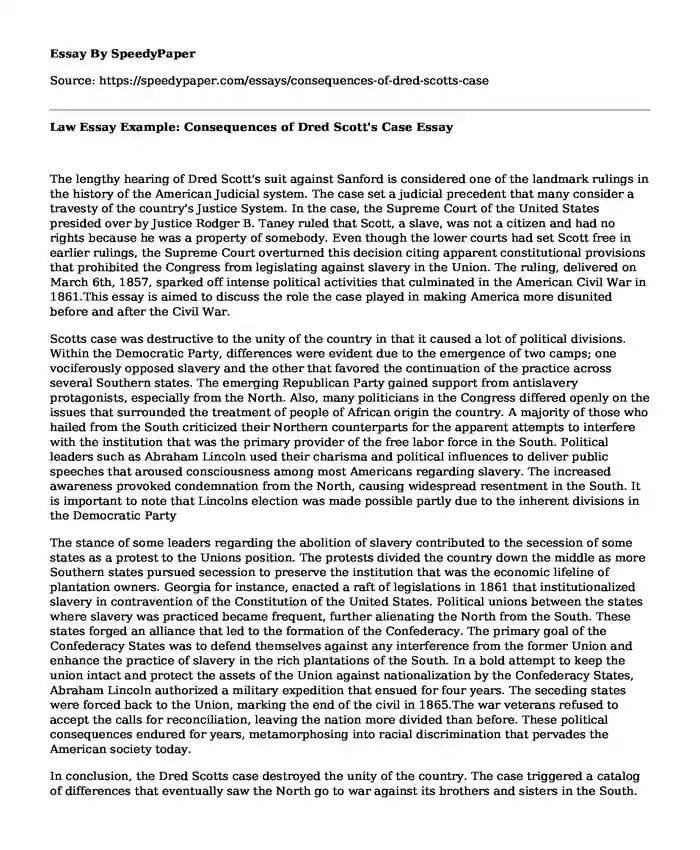
| Type of paper: | Essay |
| Categories: | United States Law Judicial system |
| Pages: | 3 |
| Wordcount: | 660 words |
The lengthy hearing of Dred Scott's suit against Sanford is considered one of the landmark rulings in the history of the American Judicial system. The case set a judicial precedent that many consider a travesty of the country's Justice System. In the case, the Supreme Court of the United States presided over by Justice Rodger B. Taney ruled that Scott, a slave, was not a citizen and had no rights because he was a property of somebody. Even though the lower courts had set Scott free in earlier rulings, the Supreme Court overturned this decision citing apparent constitutional provisions that prohibited the Congress from legislating against slavery in the Union. The ruling, delivered on March 6th, 1857, sparked off intense political activities that culminated in the American Civil War in 1861.This essay is aimed to discuss the role the case played in making America more disunited before and after the Civil War.
Scotts case was destructive to the unity of the country in that it caused a lot of political divisions. Within the Democratic Party, differences were evident due to the emergence of two camps; one vociferously opposed slavery and the other that favored the continuation of the practice across several Southern states. The emerging Republican Party gained support from antislavery protagonists, especially from the North. Also, many politicians in the Congress differed openly on the issues that surrounded the treatment of people of African origin the country. A majority of those who hailed from the South criticized their Northern counterparts for the apparent attempts to interfere with the institution that was the primary provider of the free labor force in the South. Political leaders such as Abraham Lincoln used their charisma and political influences to deliver public speeches that aroused consciousness among most Americans regarding slavery. The increased awareness provoked condemnation from the North, causing widespread resentment in the South. It is important to note that Lincolns election was made possible partly due to the inherent divisions in the Democratic Party
The stance of some leaders regarding the abolition of slavery contributed to the secession of some states as a protest to the Unions position. The protests divided the country down the middle as more Southern states pursued secession to preserve the institution that was the economic lifeline of plantation owners. Georgia for instance, enacted a raft of legislations in 1861 that institutionalized slavery in contravention of the Constitution of the United States. Political unions between the states where slavery was practiced became frequent, further alienating the North from the South. These states forged an alliance that led to the formation of the Confederacy. The primary goal of the Confederacy States was to defend themselves against any interference from the former Union and enhance the practice of slavery in the rich plantations of the South. In a bold attempt to keep the union intact and protect the assets of the Union against nationalization by the Confederacy States, Abraham Lincoln authorized a military expedition that ensued for four years. The seceding states were forced back to the Union, marking the end of the civil in 1865.The war veterans refused to accept the calls for reconciliation, leaving the nation more divided than before. These political consequences endured for years, metamorphosing into racial discrimination that pervades the American society today.
In conclusion, the Dred Scotts case destroyed the unity of the country. The case triggered a catalog of differences that eventually saw the North go to war against its brothers and sisters in the South. The War left Americans became more divided after the civil war. These consequences, however, resulted in the abolition of slavery. The release of Scott to become a free man heralded a new chapter in the Negro community in the United States. Even though it took another century after the civil to enfranchise African-Americans, the contributions of the case stands out as one of the greatest statements of the enslaved black voices that changed the complexion of the American society.
Cite this page
Law Essay Example: Consequences of Dred Scott's Case. (2019, Jun 25). Retrieved from https://speedypaper.com/essays/consequences-of-dred-scotts-case
Request Removal
If you are the original author of this essay and no longer wish to have it published on the SpeedyPaper website, please click below to request its removal:
- Automotive Industry Analysis Sample
- Essay Sample on Alice in Wonderland and the World Today
- Law Essay Sample: Right to Abate a Nuisance
- Healing and Decolonizing Participatory Research: Anishnaabe Symbol-Based Reflection
- Research Paper Example on the Programs for Alcohol Prevention among the Youth
- Industrial Hygiene Essay Example
- Supply and Demand in Price Management
Popular categories




